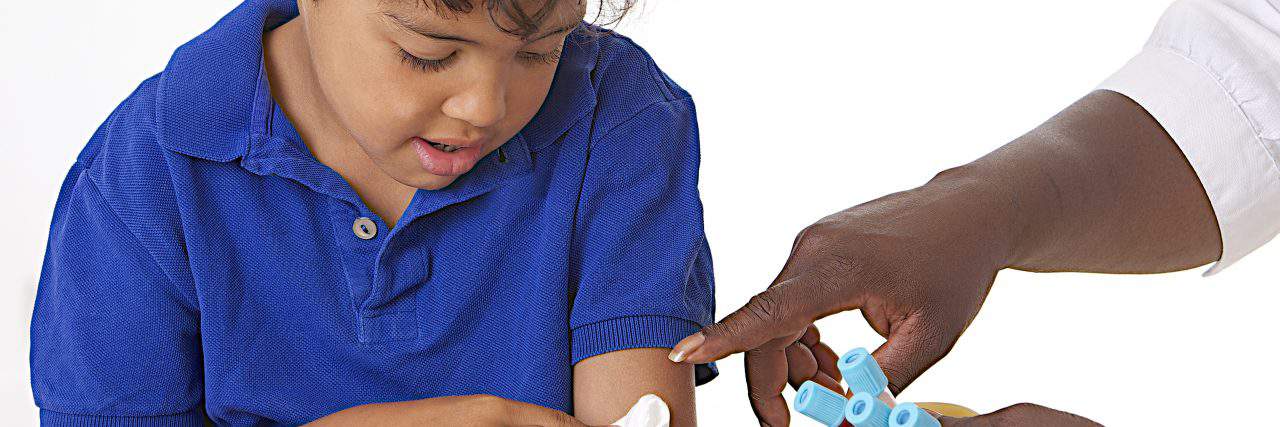My son is 2.5 years old. He has several chronic medical conditions that require frequent doctor appointments, loads of daily meds, a special diet of formula that he receives through a feeding tube, and 30+ hours of therapies a week. His conditions also require fairly regular labs to assess the status of his many conditions. Unfortunately, these labs require blood draws.
If you have ever taken your toddler to get blood drawn, you immediately feel my pain on a visceral level. It goes against every fiber of my being to hold him down against his will, despite his desperate, anxious, fearful pleas, screams and cries. It is contrary to everything I do in my every waking day to subject him to pain and emotional suffering. But I know, as an adult and as his mother, these labs are important and necessary for his overall health. They are not optional, and because of that, his pain and emotional stress is just one more thing I have to accept as “part of his journey,” along with all of the other things my brave boy handles every day. Just as I wish he would not have to get blood drawn two to three times a year, I also wish he did not have mast cell activation syndrome (MCAS), or that he did not require a feeding tube. The list goes on, and so must I. So, last week, I took him to the lab for his blood draws.
Each time I take him for labs is more challenging than the last. The older he gets, the more aware he is, the better his memory is, the more anxious he becomes, the harder it is to hold him down, and the more traumatic the experience is for him. It takes two adults to hold him steady while the phlebotomist works as quickly and carefully as possible. Every time the phlebotomist’s assistant holds his flailing arm down — pinning his elbow straight against the arm rest of the chair — I’m terrified he will injure himself during his struggle to wriggle free.
Despite my fears, I remain focused. My number one job during lab draws is to make sure he gets through it as quickly as possible, with as few adverse reactions as possible. My task is to be his strength. This means that I must manage my own fears and anxieties. I cannot stop his tears, but I can control mine. I cannot make it hurt less, for either of us, but I can try to distract him (and me) by singing his favorite songs. And I can hold on tight — even tighter than last time — because that is what I need to do. Letting him move is not an option, and in my mind, contributing to his chaos with my own tears is not an option either. Focusing on my task, on my one job, helps me keep my composure. I can cry later, when we’re home and he’s safely asleep for the night. But for those tumultuous minutes, I am his strength when he needs me most.
Generally, as soon as the labs are done, I strap him into his stroller, give him some Benadryl (to help with mast cell reactions), and we move on with our day, albeit shaken, exhausted and emotionally depleted. But last week, he was more shaken than usual, and required more from me to help him calm down after the blood draw. While sitting close to him, I fantasized about curling up on the couch with my husband later in the evening, debriefing and crying to release from the pressure of the day. But in that office, on the floor next to my son, I held my composure, and I would not break.
But then it happened — she broke me. His phlebotomist. The woman who tried to entertain him with her adorable cow figurine, who tried to get us in and out as quickly as possible. The woman who successfully stuck his vein on the first try, drawing his blood as quickly and carefully as possible. The woman who worked with my son with all the professionalism and care you could hope for from someone in that position. His phlebotomist approached me and asked me to sign some paperwork, so I stood up and marked my name on the dotted line. She then turned to me and threw her arms around me in the biggest, firmest, not-letting-go-until-you-know-I-am-completely-sincere way. She held me tight and told me, “You are so strong. You are so strong.”
My son’s phlebotomist made me cry. She broke my hard outer shell, and she allowed me to acknowledge the pain and release my fears and anxieties. My son, at that point, was calm in his stroller, entertained by one of his therapists, and did not see me cry. I succeeded in maintaining my composure in front of him, and then, because of this act of kindness, I was given a safe place to feel and to release. Ultimately, her professional care and handiwork gave my son a safe experience, and her hug gave me mine.

